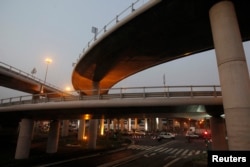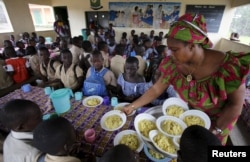A new study about Africa shows the importance of developing roads, electrical grids, health clinics and other forms of infrastructure for promoting development — and reducing poverty.
The survey by the polling firm Afrobarometer, a nonpartisan research network, found that more than 20 countries in Africa have improved economic growth and living conditions with active government support.
The report found that 22 out of the 33 countries surveyed showed impressive improvements in some of the “development infrastructure” that lifts living standards, such as food, clean water, cooking fuel, health care and income. The study's conclusions were based on interviews with nearly 53,000 people across Africa.
Robert Mattes, a senior adviser for the Africa-wide polling firm and a professor of political science at the University of Cape Town in South Africa, said that in general, poverty levels were lower in urban areas and among those with secondary and postsecondary educations.
Government support
But the survey found that improvements, especially in rural areas and among those without education, depended to a large degree on government action.
“[Former U.S. President] Bill Clinton used to like to talk about giving people a hand up rather than a hand out,” said Mattes, “and you can see how this applies. These are not direct relief services to people, like providing them with food or government employment strategies. It’s simply building things … paved roads, putting electricity in, putting a sewage network in. People seem to be able to use that to get on with their lives in a much better way than where government hasn’t done those basic things.”
North African countries, many with authoritarian regimes, scored highest in the survey.
“We’ve only been conducting surveys in North Africa for four years,” said Mattes, “but we were surprised at the level of infrastructural development. It was substantially higher than what we’ve seen [in other parts of Africa] in previous surveys.”
“What is clear,” he continued, “is the authoritarian regimes in those areas — maybe simply as a means to stay in power — have invested a substantial share of oil wealth into education, health clinics, sewage, electricity, et cetera.”
In sub-Saharan countries, there were both successes and failures.
Mozambique, Benin and Liberia were among five countries with the largest increases in poverty, while five others showed no improvement. People in areas with conflict and health emergencies, such as Central and West Africa, reported having the most frequent shortages.
Sub-Saharan successes
On the other hand, living standards have increased in several countries.
Among them are Cape Verde, Zambia and Ghana — countries that have used to their advantage the support of international funding sources like the Millennium Challenge Corporation. Mattes said the three countries were the only ones to show a long-term trend in reducing poverty since 2002.
Senegal, Namibia, South Africa and Zimbabwe showed decreases in poverty going back to 2008. Mattes attributed South Africa's improvement to its expansive social welfare network, which accounts for a large part of the budget.
For many years, poor policy decisions and international sanctions contributed to increased poverty in Zimbabwe, which has been ruled for decades by the ZANU-PF party led by Robert Mugabe. But that changed when a government of national unity took power in 2013, and the opposition Movement for Democratic Change held Cabinet posts affecting finance and economic development.
“One of the ironies,” said Mattes, “is the policies the MDC brought to the table were largely responsible for stabilizing the country and bringing back decent living conditions ... though they couldn’t claim credit, largely because of the ZANU-PF government’s control of the state news media.
“They found it very hard getting state TV and radio to cover them," Mattes said, so the MDC "often abandoned the field, and ZANU-PF claimed they improved living conditions.”
Mattes said to ensure further decreases in poverty, African governments have to improve their tax systems. He said it’s not clear whether many states have the capacity to tax national and international companies. Their taxes are essential if governments are going to have enough money to invest in development.






